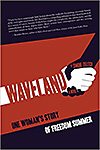Review — WAVELAND by Simone Zelitch (Hungary)
Waveland: One Woman’s Story of Freedom Summer
(Fiction)
Simone Zelitch (Hungary 1991–93)
The Head & The Hand Press
2015
224 pages
$18.00 (paperback)
Reviewed by Linda Mather
•
“Once there was a girl who did everything wrong.”
Waveland by Simone Zelitch starts with this sentence, which then sets the tone for the book.
Most of the novel is set around events in the Civil Rights Movement in the late 1960s including efforts to register black voters in Mississippi, to gain seats at the Democratic National Convention in Atlantic City, to establish grass roots mobilization in Chicago. And much of that is common to most movements — the clash between the whites and blacks both in the organization of the movement as well as in the towns, the motivation of the volunteers (Beth notes that she didn’t join to type letters), to the philosophies of the organizers themselves (short term goals vs. changing society).
However, the setting seems artificial in the sense that probably other social movements could have also been used — protests for environmental causes, gay rights, and police violence. Similarly the fact that Beth is Jewish, albeit not practicing, also seems fortuitous rather than integral. Yes, she is an outsider both as a white and as a Jew . . . therefore?
All of which leads to the issue of who is Beth. If she is the girl who does everything wrong, what and why does she do so? She does causes problems in the movement — crashes her car, shoots someone, and ultimately has a biracial baby — but why? And her actions cause trouble for others. In fact, at one point, she wonders “if her presence was a liability.”
In terms of background, Beth has had a mentally ill mother, a father who loves her but doesn’t know how to show it, and an aunt who practices tough love. Is family destiny?
Her relationship with Ron, the black father of the baby, is based seemingly on sex. She quotes Pascal, “The heart has its reasons, which reason does not know.” That might work for Beth but for Ron? He remains unclear in his motivation. It isn’t until two thirds of the way into the book, that events are narrated from his point of view — including a meeting with his estranged father. Here too the historic events afford a frame — the FBI found his father before he did because of their efforts to find Ron, a draft dodger. His father, a restaurant owner, does not want to be involved with the FBI and therefore does not embrace Ron.
Beth and Ron in their own ways do raise their child (Tamara) and the end of the book finds them together attending her graduation from Stanford. The three of them take a nostalgic trip to Mississippi, but even here the last event is one that Ron and Tamara do not want to participate in.
Beth seemingly does not learn from this events. The last sentence of the book states “this was just who she was, and if she kept it up, she would ruin everything.”
The reader is left wanting to take her by the shoulders and shake her.
•
Reviewer Linda Mather is the spouse of a Peace Corps Volunteer Donald Mather (Pakistan 1963–65). “We visited Pakistan together in 1979–80 when I was working on a research project documenting the women’s clothing. Slides from that project are now housed with the University of Pennsylvania Museum of Archeology and Anthropology. I have taught at the college level, served in the state education agency, and headed a nonprofit focused on health policy.”
Thank you for the review. I do have one question about this statement”
“Most of the novel is set around events in the Civil Rights Movement in the late 1960s including efforts to register black voters in Mississippi, to gain seats at the Democratic National Convention in Atlantic City, to establish grass roots mobilization in Chicago.”
Freedom summer was not in the late 60s, but rather 1964 and the goal was to register black voters in Mississippi. The Democratic Convention held in Atlantic City was held in 1964. The timing is so historically important. Although the “late sixties” is not identified, it should be noted that they were marked by the assassinations of Martin Luther King and Robert Kennedy, as well as the Anti-War movements.
I am not sure if the author put these events in the late sixties or if the reviewer did. It would make a difference.
I just read this review and appreciate its honesty and take on the book, but the review’s author got one key fact wrong. I most certainly didn’t put the Mississippi Summer Project in the late 1960s. That part of the book is set in 1964, as is the Democratic Convention and the challenge by the Mississippi Freedom Democratic Party. Those who want to find out more about the book– and my new one that just came out– are welcome to check out my website: http://www.simonezelitch.com.